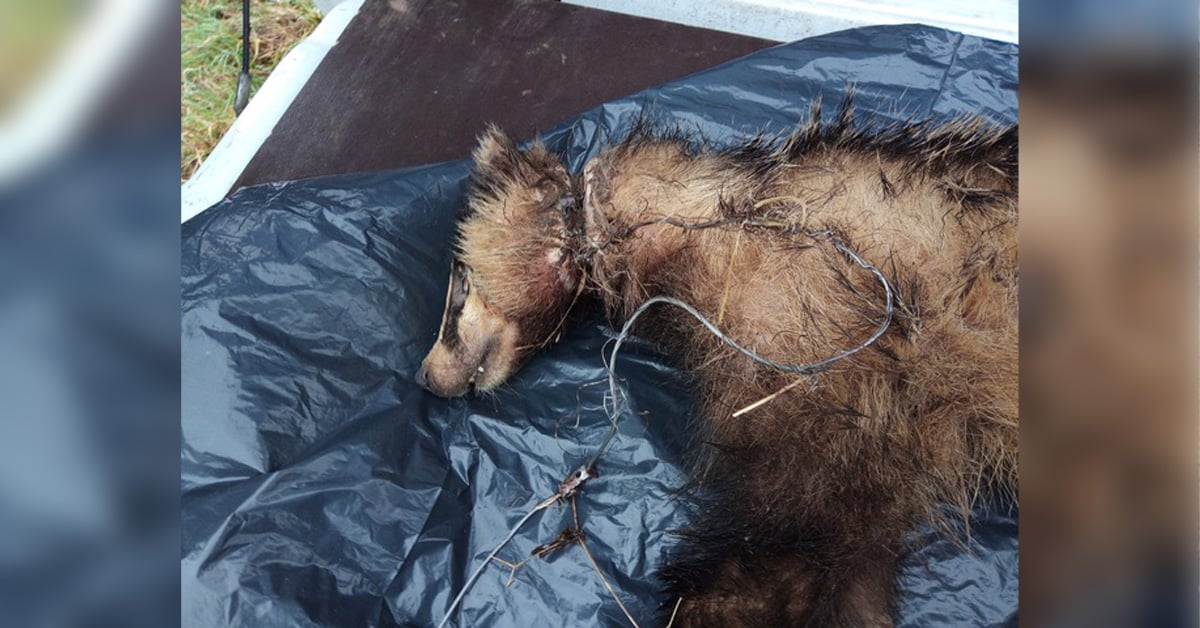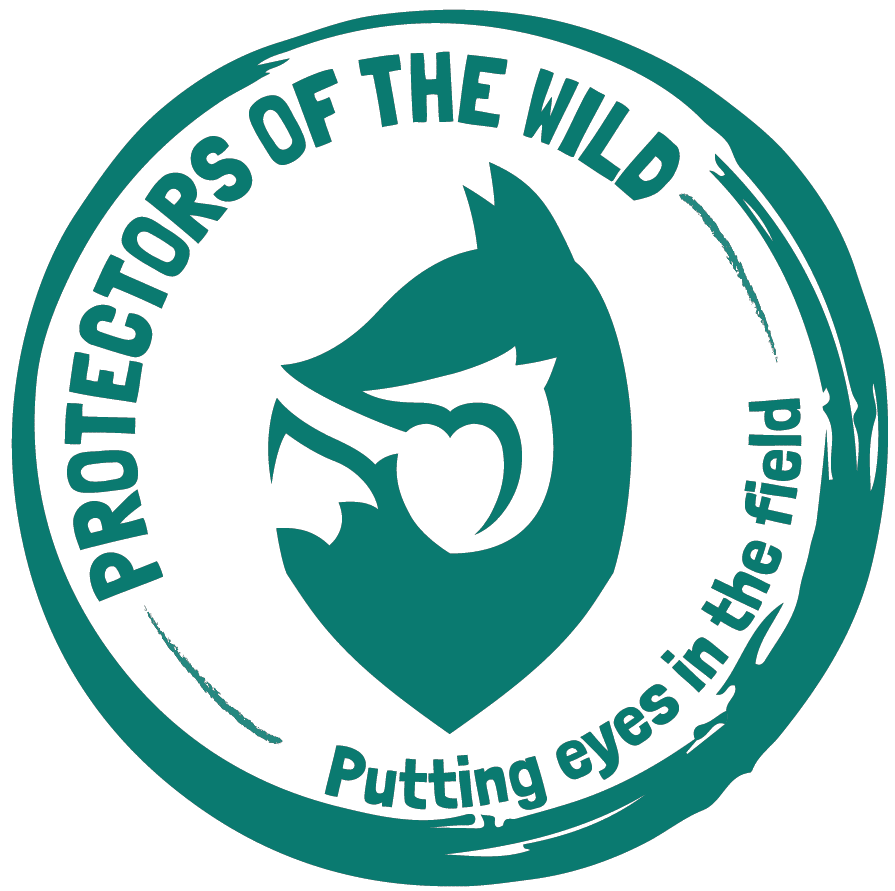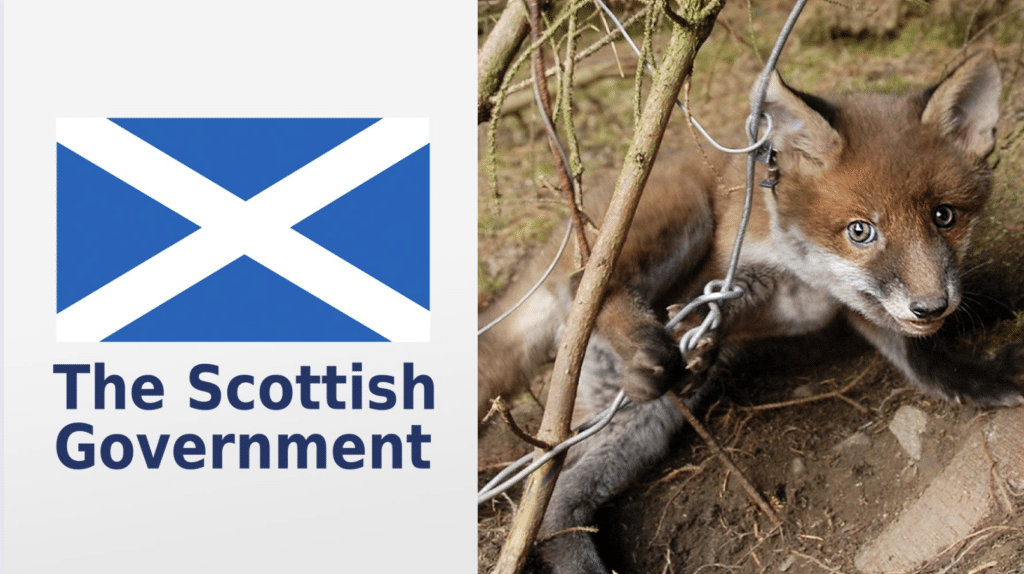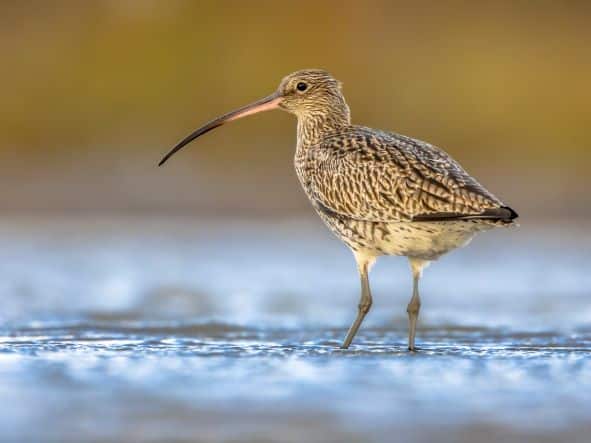As the Scottish government considers a ban on the use of snares, land owners and gamekeepers have been making their pro-snare, pro-cruelty voices loudly heard. Recognising what an irretrievably appalling image snares have, they’re trying to rebrand the devices by giving them a friendlier name: humane cable restraints.
A government consultation, asking the public for views on the ban, ended on 3 October. The majority of those who took part supported a ban.
Scotland’s proposal comes on the heels of Wales, which has passed the Agriculture (Wales) Act. The legislation in Wales will actually come into force on 17 October, and makes the use of snares and glue traps illegal. Anyone found guilty of using one of the death traps could receive an unlimited fine, face imprisonment, or both.
And so Scottish gamekeepers and landowners are running scared, terrified that a snare ban will become law in their country. Protect the Wild has repeatedly reported on their love of murdering mammals and birds through snares, traps and poisons, so it should come as little surprise that they are trying to hoodwink politicians into legalising snares by calling them something else.
Inhumane
Of course, there’s nothing ‘humane’ about so-called humane cable restraints. In fact, they’re just the same old snares being marketed as something else – and animals still die.
Scottish animal welfare charity OneKind warned:
“In May this year, when the Bill that could ban snares in Scotland was introduced to Parliament, civil servants said that they had been told by land management and gamekeepers organisations that there was a “new development” in snaring techniques, called “humane cable restraints”, and that they are less harmful so should be permitted if snares are banned. The only thing new about them is the name!”
OneKind explained:
“The descriptions of the design specifications of “humane cable restraints” are the same as the descriptions in codes of practice for snaring in all three nations of Great Britain. Not only that, but the picture used by the Game and Wildlife Conservation Trust in a briefing on “humane cable restraints” is identical to the picture in both the Welsh and English codes of practice for snaring, which were published in 2015 and 2016.”

Intimidation tactics
When the Welsh Bill was introduced, gamekeepers used the exact same tactic, attempting to convince politicians that a humane cable restraint was actually an entirely different contraption. Back in July 2022, an email briefing to Welsh ministers stated:
“GWCT [Game and Wildlife Conservation Trust] and others have been attempting to rebrand Code-compliant snares as Humane Cable Restraints… The rebranding is aimed at persuading Ministers to allow certain named groups to continue to use snares following the proposed ban.”
Attempts were made to amend parts of the Bill, aiming to introduce the licensed use of cable restraints. The amendments were not accepted.
David Pooler, Chairman of The National Gamekeepers’ Organisation, said at the time:
“The NGO has repeatedly asked the Welsh Government to ban old-fashioned snares. We have demonstrated to them the vast differences between these and the modern humane cable restraints, which people such as the GWCT have put vast amounts of time and money into developing. We have produced the science to back up the use of humane cable restraints. Sadly, the Welsh Government have chosen to ignore all of this, and simply ban all snares outright.”
But Welsh minister Lesley Griffiths stated in a Senedd debate:
“To be very clear, a so-called humane cable restraint and a code-compliant snare are identical in every way, and have been in use since 2012″.
She went on to say:
“My position remains unchanged… snares, whether they be code compliant—referred to in this amendment as ‘humane cable restraints’—or not, are incompatible with the high standards of animal welfare that we strive for in Wales. They are inherently inhumane for both target and non-target species.”
Days later the British Association of Shooting and Conservation (BASC) threatened to take legal action. It sent Griffiths a letter, obviously hoping that she and Welsh politicians would be intimidated into backing down. The pro-shooting lobbyist said:
“BASC will be exploring the basis on which the Welsh Government took this decision, and the evidence and research on which you relied. If we conclude that the Welsh Government has acted improperly, we will not hesitate to take legal action.”
The shooting lobby will not hesitate to use the same bullying tactics on Scotland, too, if legislation banning snares passes through parliament – something that Scottish ministers will be well aware of.
Conservation and curlews
The shooting industry is the predominant user of snares in the UK. It should come as little surprise then that its gamekeepers protesting loudest, not only lamenting that a ban on humane cable restraints would be “devastating” to their livelihoods, but claiming that it will also mean a “crippling blow” to biodiversity and particularly devastating for ground-nesting birds such as the curlew. With her beautiful curved beak, the poor curlew, declining mostly because of landscape-scale changes to wet grassland by the agriculture industry not predation by foxes, has become the modern poster child of the pro-shooting lobby.
GWCT previously attempted to convince Welsh ministers that the curlew would be extinct in Wales by 2033 if humane cable restraints were banned. But the Welsh government wasn’t buying it, and an all-out ban was passed.
Scotland is leaps and bounds ahead of neighbouring England when it comes to animal rights. 150 land owners recently pressured the SNP government to prevent a blanket ban on snares, but as Scottish ministers previously showed when they banned fox hunting, they won’t easily be hoodwinked. And so we can, hopefully, be confident that Scotland will follow in the path of Wales and ban all snares – no matter what shooting fanatics label them as.
 For more information on the use of snares in the UK, what animals snare users are targeting, and what to do if we find an animal trapped in one unlawfully, please go to our Protectors of the Wild page > Snares and the Law
For more information on the use of snares in the UK, what animals snare users are targeting, and what to do if we find an animal trapped in one unlawfully, please go to our Protectors of the Wild page > Snares and the Law


